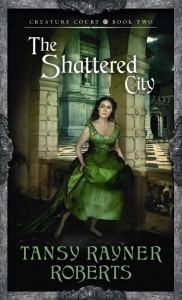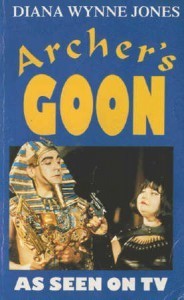Tansy Rayner Roberts's Blog, page 144
April 6, 2011
Galactic Suburbia 29
Episode 29 is up and it's a doozy! Grab it from iTunes, by direct download or stream it on the site.
Then, if you can, come join us at Swancon on Easter Sunday for the live recording of EPISODE FREAKING THIRTY!
====
EPISODE 29
In which we rant about feminist issues and gender disparity (are you shocked?), Alisa proclaims the death of bookstores and publishing, we look at branding and internet dramah, plus a million zillion award shortlists, TANSY BEING A TIPTREE JUDGE, a Swancon preview, and… um. It's a bit long. But full of crunchy Galactic Suburbian goodness.
News
Diana Wynne Jones passed away, many people said good things about her on the internet
Shaun Tan wins the Astrid Lindgren Award
Guardian coverage; Shaun's personal take on the award
Carol Emshwiller's 90th birthday celebrations
25 A&R franchises in Australia go indie
(apologies original link vanished)
Strange Horizons – dealing with the low numbers of female reviewers
Original post, counting up numbers of female reviewers and women's books reviewed in SF markets
The Age on the poor numbers of women's work being reviewed (in the literary "mainstream")
and coverage of a panel on the gender disparity, again in literary mainstream
Prometheus Awards nominees, from the Libertarian Futurist Society:
Running Press, Tricia Telep and Jessica Verday
http://charles-tan.blogspot.com/2011/...
http://blog.outeralliance.org/archive...
http://www.publishersweekly.com/pw/pr...
TANSY BECOMES A TIPTREE JUDGE!!
Aurealis Awards: www.aurealisawards.com/finalists2010.pdf
Ditmars: http://2011.swancon.com.au/2011/03/na...
Tin Ducks: http://2011.swancon.com.au/tin-duck-a...
Chronos Awards: http://arcadiagt5.livejournal.com/362...
Livejournal not so live this week – AK has existential crisis about blogging & identity.
Feedback
Aishwarya, Kaia, Adam
Competition winners!
Swancon Preview
Eeeeeeeeeeeeeeeeee!
Our live panel is 9:30 am on the Easter Sunday, bring coffee!
Please send feedback to us at galacticsuburbia@gmail.com, follow us on Twitter at @galacticsuburbs, check out Galactic Suburbia Podcast on Facebook and don't forget to leave a review on iTunes if you love us!
April 4, 2011
Agathon 1. The Mysterious Affair at Styles (1920)
Kathryn and I have taken the challenge to read every book written by Agatha Christie, in order of publication and we're blogging as we go along. We're calling it the Agathon! You can find Kathryn's post over here if you'd like to read the conversation going on in the comments. As a warning, there may be spoilers, though they will be signposted.
1 – The Mysterious Affair at Styles (1920)
Featuring: Hercule Poirot, Arthur Hastings, Inspector Japp
TANSY SAYS: Wow, I was not expecting the first person narrator. It's all very Watson and Holmes, isn't it? I rather loved Hastings, silly rabbit that he is, and the way we get to see Poirot through his eyes. Also his tendency to fall in love with unattainable women and accidentally propose to entirely different women! It's all a bit Dorothy Sayers, really. Is that heresy?
I knew nothing about Hastings going into this – I've never read a book with him as narrator before and it's funny to see Poirot as part of this odd partnership. Also, I'm a little taken aback to see Poirot described as so VERY old, retired already… goodness. Doesn't he have another 50 years of crime solving to go?
I always enjoy the mechanics of Christie's plots, and it's interesting to see that even at this early stage, she's trying to pull a bait-and-switch on the reader, messing with their expectations. I thought it was funny that the first chapter has a very post-modern discussion about murder mysteries, and how they work, and that the whole plot of this one hinges on this being a universe of clues and unnecessarily complicated murder plans – which do not go entirely to plan! It always amuses me that it's the murderer's errors that make things harder for the detective, because it's unpredictable. I was genuinely surprised that the story went as far as a trial, as I'm not used to murder mysteries having that kind of time frame, but of course that was sneaky, too.
Sneaky, sneaky lady.
Oooh, and I was delighted to see all the professional references to poisons, knowing that Christie herself worked in a dispensary during the war. Wonder if all that knowledge will come in handy for her in the future?
I read this one as an eBook on the iPad, from Project Gutenberg, and don't recommend this edition at all – there's a fairly VITAL clue missed, a note which Poirot and Hastings find, and which was evidently supposed to be depicted as an illustration. I got to find out what it said several chapters later, but it was still very annoying. Only crumpled second hand paperbacks for me in future!
KATHRYN SAYS: And so the Agathon begins! I was quite surprised to find that despite being familiar with the title, I don't actually think I've read this one before! In a lot of ways this is a very typical Christie/Poirot read – action occurs at a country house, wills and money are involved, and there is a twist at the end (which, actually I was glad to be surprised with because for a while there Christie looked like she went down a relatively staid path). The book also culminates in a very traditional Poirot-gathers-everyone-in-a-room-and-tells-em-who-dunnit, and I was pleased to see that too. Actually, it will be interesting to see if any of the Poirot books don't include that scene – certainly I can't think of any off the top of my head.
One disappointment for me was that I would have really loved to have seen how Hastings and Poirot actually met, and how they got to know each other (and what Hasting really thought of Poirot at the beginning!). However, it seems that they met 'off-screen' before this first episode – indeed even Japp turns up having worked with Poirot back in 1904. I will have to see if anything is mentioned in other books, but Poirot's journey from Belgium to England also seems have been glossed over, though I assume WWI was a driving force for the move.
Hastings's pathway through the murder was a quite typical one for him – he manages to misinterpret most of the clues, but gives Poirot a spark of inspiration through an unexpected remark, and he is ultimately kept in the dark by Poirot so he doesn't ruin the catch (poor Hastings!). Even in this first book a lot of Poirot's particular characteristics seems quite developed, though there are certain character traits that pop up later that are not in here – his love of crème de cassis, and his obsession with his moustaches for example. I did, however find it amusing, given his fastidiousness, that Poirot once house-shared with seven other Belgians. I can imagine it must have driven him quite mad!
I borrowed my copy of 'The Mysterious Affairs of Styles' from the library (Ulversoft Large Print Edition no less!), and it's quite nice to begin this way because most of my Christie exposure came in my teens when I would always check out the 'C' shelves at the library to see if there were any Christies there that I hadn't read. From my research for the Agathon, the library system still has most of her books and most of them are checked out, being read right now. Also, it wasn't til I gathered a whole lot Christie paperbacks (Fontana mostly) that I realised how absolutely cracked out some of the cover art is, and the mish-mash of clues represented on the cover of this hardback is no exception.
COMING UP SOON:
2. The Secret Adversary (1922)
Featuring: first appearance of Tommy and Tuppence; Inspector Japp (mentioned)
3. The Murder on the Links (1923)
Hercule Poirot, Arthur Hastings
4. The Man in the Brown Suit (1924)
Anne Beddingfeld, Colonel Race
April 3, 2011
The Shattered City Mighty Slapdash Blog Tour, Part 2
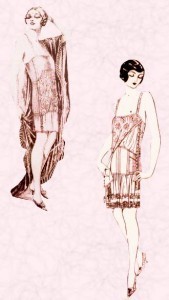 Tarran at the Angus & Robertson Edwardstown blog asked me Why the Creature Court, and what sort of sources did I use in coming up with the idea?
Tarran at the Angus & Robertson Edwardstown blog asked me Why the Creature Court, and what sort of sources did I use in coming up with the idea?
Deborah at The Best Audience Award asked me to talk about Australian women writing SF
Sarah at Egoboo WA asked me to talk about my favourite outfits in the Creature Court series! (seriously, best question ever)
Adrian Bedford asked me to talk about what I did to get an Australia Council grant (a rare thing for a fantasy author!), and particularly how to talk about work you haven't written yet.
The posts each come with a little cookie from The Shattered City, out NOW from all good Australian/NZ bookshops (I hope!) and also available as an e-book in iBooks and Kindle (I hope other ereader sites too, let me know if you source it!) Sarah gets the biggest cookie of all because, you know, she asked me about frocks.
Agathon-thon-thon
 Hooray! It wouldn't be a new year (hush, 2011 has barely started) without a crazy new reading project. This is technically my third, at last count, but who's counting?
Hooray! It wouldn't be a new year (hush, 2011 has barely started) without a crazy new reading project. This is technically my third, at last count, but who's counting?
The very awesome Kathryn Linge and I are embarking on the Great Agathon – a mighty quest to read Agatha Christie's 70 odd murder mystery novels, and various short story collections, in chronological (publishing) order. Because we wanted to.
We're going to be joint-blogging each book, and hope to have a brilliant, incredibly long conversation about it all year. And possibly well into next year. Because, you know, 70 novels! You all get to share it with us. 
Here's Kathryn's introduction post.
I've always had a soft spot for old Agatha, but read far fewer of her books than I realised. (those which I have read, I have read MULTIPLE TIMES). I'm excited to be doing this, and helpfully relieved my friend Isabel of her entire Christie collection, just before she moved house. Aren't I useful to have around?
April 1, 2011
The Shattered City Mighty Slapdash Blog Tour, Part 1
I've always liked the idea of a blog tour, but cringed a little away from the formality of it all. And, you know, despite knowing for nine months or so that this book was coming, I turned out to be completely unready to launch any kind of publicity about it. (cough, this is sounding familiar, she said, remembering the lack of birth announcements for both babies)
At the last minute I decided to do something casual and fun and utterly slapdash. I called out on Twitter and Facebook for anyone with a blog who wanted a guest post from me (they get to pick the topic!), and got back a lovely collection of volunteers. Now, of course, I have a week's work of writing said posts ahead of me, but I'm having a lot of fun tearing through them all.
Some of them have cookies (or, well, crumblets) from the new book, to tantalise new readers. Hope you enjoy! And while we're at it, I'd love to hear from anyone who has seen or bought The Shattered City in the wild.
Here are the first few:
"The Long and Short of It," over at Reading Adventures, who were nice enough to make mine their launch post for Aussie Author Month.
Hoyden About Town asked me to provide a geeky Friday Hoyden for them, and after discovering to my dismay that they had already done one on Nanny Ogg and the Witches of Lancre, I decided on the extremely awesome Jean Marsh
Julia B, who is currently embarking on a goal of writing a million words in two years (omg!) asked me to talk about how I got to where I am, which turned out to be a crazy long post about the ups and downs of my writing career so far.
Also, in case you missed it, (though not technically part of the tour) I posted recently at the Voyager blog about the portrayal of craft in fantasy and my own sewing background, with a sneak peek at a piece of my current work-in-progress, a Creature Court crazy quilt.
March 31, 2011
Today's the Day!
March 29, 2011
Hathaway, send me a bus!
There have been so many marvellous, heartfelt posts about the passing of Diana Wynne Jones, who was not only a wonderful children's author and, by all accounts, an extraordinary person, but also one of the most influential fantasists of our time.
If you only read one of these, let it be the very personal and emotional tribute from Diana's friend Neil Gaiman, one of the people called to her beside at the end. He speaks about the person he has lost as well as her work, the two things integrating seamlessly, and it is as fine a eulogy as anyone could hope for.
Emma Bull has also posted about her personal memories of Diana, with a marvellous portrait of her character and the adventures she had.
Then we have a huge collection of posts by people who did not know Diana except through her books, each trying to capture the loss they feel and just what was so important about Diana Wynne Jones and her writing.
Sarah Monette talks about DWJ's characters as outsiders with particular reference to Witch Week, about dark themes and abuse with particular reference to Charmed Life, and about the vivid humanity evident in her books.
Natalie, one of the digital editors at Voyager Books brought new insight (for me) with her post about DWJ's use of embarrassment as an obstacle and challenge for so many of her characters, and how the true definition of a hero is someone who is prepared to risk embarrassment to speak out.
Bothersome Words talked about her childhood memories of particular DWJ discoveries and favourite moments, and the importance of properly appreciating Fire and Hemlock.
Lili Wilkinson recounts her own discoveries of each book, and the dark times in which DWJ books were scarce, balanced with the joyous time of Mass Reprints – and, of course, about Fire and Hemlock.
A brief but elegant elegy from Shana at Torque Control refers to A Tough Guide to Fantasyland (the book I have MOST gifted to people, especially fantasy writers) and Diana's sharp, 'skewering' sense of humour.
Speaking of a Tough Guide to Fantasyland, Jim Hines shares an anecdote about how that book's highly sarcastic description of 'stew' as the universal meal pushed (shamed!) him to create far interesting gastronomic choices for his goblins, and to stretch beyond the easy choices.
Chris Moriarty wrote about the ten life lessons she took from Diana Wynne Jones' novels.
Many readers wrote and blogged letters to Diana Wynne Jones, as was suggested last year when she ceased chemotherapy, so that she could actually hear how important she was to us before she died. This one, reposted by Maggie Steifvater, is touching and beautiful and shows how important writers are as inspirations and role models and heroes.
Diana Wynne Jones was absolutely my hero, and I have really enjoyed reading so many testaments to the fact that she was a hero to so many writers, and readers: those who knew and loved her, and those who were deeply affected by her words, her books, her characters and her plots.
If I've missed a good post about Diana and/or her work, please let me know in the comments!
EDIT: An in-depth, evocative obituary by Farah Mendelsohn.
March 27, 2011
Thanks and Farewell to Diana Wynne Jones (1934-2011)
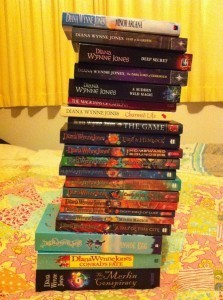 Nearly a year ago, when it became known that Diana Wynne Jones had ceased treatment for her cancer, I wrote this letter about what her works meant to me. It looks like a thin collection of words now, not nearly enough, but I am not in a particular mind to try to expand upon it.
Nearly a year ago, when it became known that Diana Wynne Jones had ceased treatment for her cancer, I wrote this letter about what her works meant to me. It looks like a thin collection of words now, not nearly enough, but I am not in a particular mind to try to expand upon it.
Instead, inspired by Celia, I'm sharing a picture of the eclectic, well-rumpled Diana Wynne Jones books that have a permanent place on my bookshelves, taking up a fair chunk of precious real estate in my library. This is where they belong.
What I love most is that I can see at a glance the archaeology of my DWJ reading history. The first books of hers I collected were madly random, and either second hand or plucked from obscure corners of bookshops. Mostly I couldn't find them at all, and had to read them from the library instead. Then came the rather marvellous post-Potter era in which her books were suddenly released in their entirety, in colourful, attractive covers. Then, after the Diana Wynne Jones Renaissance, which I imagine was at least partly fuelled by people like me who desperately plugged every hole in their collection by buying these books by the handful, as well as new and eager post-Potter readers, there are the New Era Diana Wynne Jones books, beginning with the Merlin Conspiracy, which came out in larger, trade and even hardback editions.
Books. They are so pretty, and they tell a story. Diana Wynne Jones will continue to be read, and reread, in this household for many years to come.
* * *
EDIT: Looking at this, it so is NOT my complete collection, damn it. Where is Archer's Goon and Tough Guide to Fantasyland? Now I'm going to have to tidy my library again.
March 25, 2011
Nice Things
Power and Majesty is now both an Aurealis Awards shortlisted book AND a Ditmar shortlisted book. How awesome is that?
I'm also rather pleased to be on fan shortlists for my Modern Woman's Guide To Classic Who blog posts, and especially for Galactic Suburbia. How exciting! The Fan Production category has turned into a podcastapalooza which is marvellous (the only non podcast there is ASiF, another project I love). Listening to podcasts has become one of my primary interactions with fandom and criticism, and it's really special to see the Year of Aussie SF Podcasts honoured in that shortlist.
In other news, some of my favourite fiction from last year is on the shortlists too! I loved Trent's book, and all the other novel nominees are teetering near the top of my To Read pile. I'm glad to see Cat Sparks' "All The Love In The World" on there, which was one of my favourite Aussie stories last year. Nice also that Thoraiya Dyer's "The Company Articles of Edward Teach" made it on, as it was a very late release in 2010 and I thought people would miss how great it was. Thoraiya made Best New Talent, too, which I wanted to see last year, though admittedly I was in the position of having read some of the great stories she hadn't published yet. Since then she's not only had some good stuff published for Twelfth Planet Press but also sold a story to pro market Cosmos! Looking down the lists, there are people I love and respect all over these Ditmars. How wonderful!
Congratulations to all the nominees. I look forward to seeing most of you at Swancon for the ceremony!
In other Nice Things News, a few reviews have flitted past my screen this week: a very thoughtful review analysis of Power and Majesty (it's so nice when readers completely get what I was doing with my characters, and I love how she described Ashiol as being a Bruce Wayne type) and a nice little teaser review of "Relentless Adaptations" from Sprawl.
Full Ditmar Ballot below:
Best Novel
Death Most Definite, Trent Jamieson (Hachette)
Madigan Mine, Kirstyn McDermott (Pan Macmillan)
Power and Majesty, Tansy Rayner Roberts (Voyager)
Stormlord Rising, Glenda Larke (Voyager)
Walking the Tree, Kaaron Warren (Angry Robot Books)
No Award
Best Novella or Novelette
"Acception", Tessa Kum (Eneit Press)
"All the Clowns in Clowntown", Andrew McKiernan (Brimstone Press)
"Bleed", Peter M. Ball (Twelfth Planet Press)
"Her Gallant Needs", Paul Haines (Twelfth Planet Press)
"The Company Articles of Edward Teach", Thoraiya Dyer (Twelfth Planet Press)
No Award
Best Short Story
"All the Love in the World", Cat Sparks (Sprawl, Twelfth Planet Press)
"Bread and Circuses", Felicity Dowker (Scary Kisses, Ticonderoga Publications)
"One Saturday Night With Angel", Peter M. Ball (Sprawl, Twelfth Planet Press)
"She Said", Kirstyn McDermott (Scenes From the Second Storey, Morrigan Books)
"The House of the Nameless", Jason Fischer (Writers of the Future XXVI)
"The February Dragon", Angela Slatter and Lisa L. Hannett (Scary Kisses, Ticonderoga Publications)
No Award
Best Collected Work
Baggage, edited by Gillian Polack (Eneit Press)
Macabre: A Journey through Australia's Darkest Fears, edited by Angela Challis and Marty Young (Brimstone Press)
Scenes from the Second Storey, edited by Amanda Pillar and Pete Kempshall (Morrigan Books)
Sprawl, edited by Alisa Krasnostein (Twelfth Planet Press)
Worlds Next Door, edited by Tehani Wessely (FableCroft Publishing)
No Award
Best Artwork
Cover art, The Angaelien Apocalypse/The Company Articles of Edward Teach (Twelfth Planet Press), Dion Hamill
Cover art, Australis Imaginarium (FableCroft Publishing), Shaun Tan
Cover art, Dead Sea Fruit (Ticonderoga Publications), Olga Read
Cover art, The Girl With No Hands (Ticonderoga Publications), Lisa L. Hannett
"The Lost Thing" short film (Passion Pictures), Andrew Ruhemann and Shaun Tan
No Award
Best Fan Writer
Robert Hood, for Undead Backbrain
Chuck McKenzie, for work in Horrorscope
Alexandra Pierce, for body of work including reviews at Australian Speculative Fiction in Focus
Tehani Wessely, for body of work including reviews at Australian Speculative Fiction in Focus
No Award
Best Fan Artist
Rachel Holkner, for Continuum 6 props
Dick Jenssen, for cover art of Interstellar Ramjet Scoop
Amanda Rainey, for Swancon 36 logo
No Award
Best Fan Publication in Any Medium
Australian Speculative Fiction in Focus, edited by Alisa Krasnostein et al.
Bad Film Diaries podcast, Grant Watson
Galactic Suburbia podcast, Alisa Krasnostein, Tansy Rayner Roberts, and Alex Pierce
Terra Incognita podcast, Keith Stevenson
The Coode Street podcast, Gary K. Wolfe and Jonathan Strahan
The Writer and the Critic podcast, Kirstyn McDermott and Ian Mond
No Award
Best Achievement
Helen Merrick and Andrew Milner, Academic Stream for Aussiecon 4
Amanda Rainey, cover design for Scary Kisses
Kyla Ward, Horror Stream and The Nightmare Ball for Aussiecon 4
Grant Watson, Media Stream for Aussiecon 4
Alisa Krasnostein, Kathryn Linge, Rachel Holkner, Alexandra Pierce, Tansy Rayner Roberts, and Tehani Wessely, Snapshot 2010
No Award
Best New Talent
Thoraiya Dyer
Lisa L. Hannett
Patty Jansen
Kathleen Jennings
Pete Kempshall
No Award
William Atheling Jr Award for Criticism or Review
Leigh Blackmore, for Marvels and Horrors: Terry Dowling's Clowns at Midnight
Damien Broderick, for editing Skiffy and Mimesis: More Best of Australian Science Fiction Review
Ross Murray, for The Australian Dream Becomes Nightmare
Tansy Rayner Roberts, for A Modern Woman's Guide to Classic Who
No Award
"She Vanquished Me" – Doctor Who: Battlefield
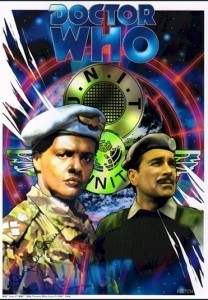 I ordered the DVD of Doctor Who: Battlefield recently in a wave of nostalgia about the late Nicholas Courtney. His 'I just do the best I can' speech had been a big part of many reminiscence post about the Brigadier as an iconic character, and it was ages since I'd seen the story. It was one of my favourites when I was a teenager, and forms part of one of my favourite Doctor Who eras: the Seventh Doctor and Ace.
I ordered the DVD of Doctor Who: Battlefield recently in a wave of nostalgia about the late Nicholas Courtney. His 'I just do the best I can' speech had been a big part of many reminiscence post about the Brigadier as an iconic character, and it was ages since I'd seen the story. It was one of my favourites when I was a teenager, and forms part of one of my favourite Doctor Who eras: the Seventh Doctor and Ace.
So the other night, when my honey was away for work and the kids were in bed and no one was being wrong on the internet, I settled down with some sewing to watch it. I was a bit worried that the suck fairy might have visited since I last inhaled this one, especially as I have heard so much fan dismissal of it as a story, but my worried were unfounded.
Battlefield is AWESOME.
For a start, it's gorgeously shot on location. They actually used money on it, in a way that surprised me – several uses of a helicopter, for instance, and at least half as much military hardware than we saw in the whole original UNIT years.
Also, it's a clever story. At times it is a little thinly expressed, and there's certainly a much larger epic tale going on here in between the scenes we actually see, but it centres around Arthurian legend, we don't actually need to be told all the details: there's Morgaine, there's Ancelyn (Lancelot), there's Mordred, the Doctor might be Merlin, it's science fiction not magic, let's do this thing!
(apropos of nothing, is there Mordred/Ancelyn slash out there? I know there must be, there's everything slash out there, I learned my lesson when I checked on the existence of Crookshanks/Padfoot, but still… if there isn't Mordred/Ancelyn, there is something very wrong with the internet)
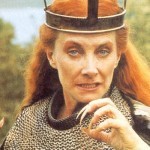 Jean Marsh playing Morgaine was not a particular revelation to me. I always loved her in this role, though my brain had understandably squished it together with Queen Bavmorda in Willow, a far less subtle take on the Evil Queen Sorceress type character that Marsh does so well. Morgaine looks magnificent, and owns every scene she is in.
Jean Marsh playing Morgaine was not a particular revelation to me. I always loved her in this role, though my brain had understandably squished it together with Queen Bavmorda in Willow, a far less subtle take on the Evil Queen Sorceress type character that Marsh does so well. Morgaine looks magnificent, and owns every scene she is in.
The thing I had not quite put together when watching this many times in my teens is that Jean Marsh is being reunited here with Nicholas Courtney, who played her brother in The Daleks Masterplan back in the 1960′s. Perhaps it's that I have actually listened to the audio of that story in the last year, so it meant more to me than a random piece of Who trivia, but it was lovely to see them together, threatening to kill each other, and so on.
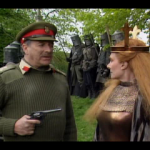 By far the most extraordinary Morgaine scene is where she discovers the significance of a War Memorial in the town, and is furious at her son for allowing her and her soldiers to desecrate a sacred site. The exchange she has with the Brigadier, when they agree to a ceasefire so she can honour the fallen from Earth's World Wars, is utterly compelling and shows that Morgaine is not just Bad Lady™ but works to her own logic. We see this dichotomy later where she kills a UNIT soldier in cold blood, then turns around and gives the blind landlady back her sight as payment for Mordred's drinks. The unpredictability of her honour system and compassion makes it more believable when, in the climax, the Doctor has to convince her that causing destruction and death on a massive scale is not in fact something that she wants.
By far the most extraordinary Morgaine scene is where she discovers the significance of a War Memorial in the town, and is furious at her son for allowing her and her soldiers to desecrate a sacred site. The exchange she has with the Brigadier, when they agree to a ceasefire so she can honour the fallen from Earth's World Wars, is utterly compelling and shows that Morgaine is not just Bad Lady™ but works to her own logic. We see this dichotomy later where she kills a UNIT soldier in cold blood, then turns around and gives the blind landlady back her sight as payment for Mordred's drinks. The unpredictability of her honour system and compassion makes it more believable when, in the climax, the Doctor has to convince her that causing destruction and death on a massive scale is not in fact something that she wants.
The Arthurian cycle is responsible for some iconic female characters, and it is lovely to see such a major actress take on a legend with a science fictional twist, and play it completely straight. Having been really impressed with Jean Marsh in audio interviews published with her recent Sara Kingdom Big Finish plays, I was also delighted to see a DVD extra all about her work on Doctor Who. She's a wicked, lovely old lady now and tells marvellous anecdotes about plotting incestous vibes between her Joanna and Julian Glover's Richard the Lionheart ("I know what you're up to," said Verity Lambert) and how she kept sandwiches in the box that was attached to Sara Kingdom's belt. She also analyses some of the characteristics of Morgaine as a character, with great detail and insight.
Lovely though Jean Marsh's Morgaine is, as one of the best female villains of Doctor Who, it wasn't only her which made me sit up and start thinking that Battlefield might be one of the most interesting Classic Who stories from a feminist point of view. Between script editor Andrew Cartmel and writer Ben Aaronovitch, this story is one of the final wave of Classic Who which was to be so influential on the two decades of books and audio plays which were to follow. You can see the seeds of the New Adventures here, with an ethnically diverse cast of characters, and and emphasis on the role of women in the military.
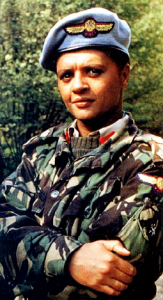 Let's talk about Brigadier Winifred Bambera (Angela Bruce). The idea of passing the Brigadier baton to a black woman is a brilliant one, but the writing and performance here makes it far more than a literary gimmick (or as the writer suggests, a shorthand technique for making it feel like the near future rather than the present). Bambera is a lovely grumpy military leader, competent and aggressive but maintaining a sense of humour throughout. I loved watching the Angela Bruce of the 21st century describing with her eyes alight how she got to play with broadswords and be in choreographed fight scenes, and about how important it was to have a role like this available to a black woman. But she does it so WELL, it makes me a little sad that Angela Bruce didn't go on to become an action hero.
Let's talk about Brigadier Winifred Bambera (Angela Bruce). The idea of passing the Brigadier baton to a black woman is a brilliant one, but the writing and performance here makes it far more than a literary gimmick (or as the writer suggests, a shorthand technique for making it feel like the near future rather than the present). Bambera is a lovely grumpy military leader, competent and aggressive but maintaining a sense of humour throughout. I loved watching the Angela Bruce of the 21st century describing with her eyes alight how she got to play with broadswords and be in choreographed fight scenes, and about how important it was to have a role like this available to a black woman. But she does it so WELL, it makes me a little sad that Angela Bruce didn't go on to become an action hero.
Bambera is most definitely an action hero. No one questions her leadership (apart from one minor joke by Brig Classic where he assumes she will be male, and that is saying more about him than her). She is bold, competent and smart – but also impulsive. She also gets one of the most satisfying and subtle romances of 1980′s Who, with Ancelyn (Marcus Gilbert), a floppy haired blond pop-star-looking interpretation of the Lancelot character. And, I have to say, the most likeable Lancelot I've ever seen. The two of them absolutely relate as equals. There's a joyous scene where their mutual warrior natures clash and they end up basically trying to beat each other up in the background of a scene between the Doctor and Ace.
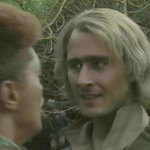 Later, they catch up with the others, Ancelyn is in handcuffs and quite obviously in love, happily informing them all that "she vanquished me and I threw myself upon her mercy." He is my favourite kind of male warrior character, the type who is so confident in his own masculinity that a powerful woman delights rather than threatens him. From then on, their courtship dance is one of embarrassed hints, jeep driving, broadsword fights, and fiery mental undressing. I love them to bits.
Later, they catch up with the others, Ancelyn is in handcuffs and quite obviously in love, happily informing them all that "she vanquished me and I threw myself upon her mercy." He is my favourite kind of male warrior character, the type who is so confident in his own masculinity that a powerful woman delights rather than threatens him. From then on, their courtship dance is one of embarrassed hints, jeep driving, broadsword fights, and fiery mental undressing. I love them to bits.
Oh, and yes. Did I mention? It's never stated, but certainly implied that Bambera is Guinevere. Her real name is Winifred after all, which is practically the same thing. Considering that even in pro-feminist retellings of Arthurian myth, Guinevere usually gets the irritating drip end of the stick, it's so exciting to have her represented here by a tough-as-nails, sarcastic, occasionally violent black female Brigadier who can wither you with her steely stare.
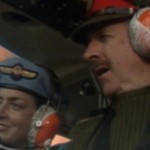 I also very much liked Lavel, a Russian wisecracking helicopter pilot who happens to be female. Her scenes with the Brigadier and later with Mordred are excellent, and most importantly, there is nothing about her role which made the female casting necessary – in the 70′s UNIT years she would have been a bloke, plain and simple. I also like that she and Bambera's 2IC are obviously not English by their accents, which helps to give more of a sense that UNIT is a global organisation.
I also very much liked Lavel, a Russian wisecracking helicopter pilot who happens to be female. Her scenes with the Brigadier and later with Mordred are excellent, and most importantly, there is nothing about her role which made the female casting necessary – in the 70′s UNIT years she would have been a bloke, plain and simple. I also like that she and Bambera's 2IC are obviously not English by their accents, which helps to give more of a sense that UNIT is a global organisation.
But I haven't even talked about Ace (Sophie Aldred) yet! This story showcases her really well as a character and is surprisingly lacking in angst. Don't get me wrong, I loves me some angsty Ace (Acengst!) but considering so many stories of this era have her dealing moodily with mother issues, guilt issues, clown issues, cute bloke turning out to be evil issues and friends kidnapped by cat people issues, it's kind of nice to see her just having fun, kicking arse and blowing things up.
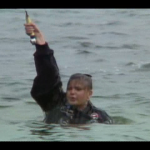 I particularly like that Ace stands in for young Arthur in the Camelot Metaphors Contest, being Merlin's apprentice as well as accidentally drawing the sword from the stone. She also makes a great 20th Century lady of the lake in her bomber jacket and leggings, and cuts through the ego of the knights with her casual attitude. She is also paired with Shou Yuing, a Chinese-English girl who actually has little role in the story, but serves to give Ace someone to talk to (not, with my Bechdel hat on, about boys or male drama, but about blowing shit up). Their friendship is challenged in a Powerful (and yes, angsty, can't get completely away from it) scene where they have to guard Excalibur in a chalk circle, with their emotions and fears being turned against them.
I particularly like that Ace stands in for young Arthur in the Camelot Metaphors Contest, being Merlin's apprentice as well as accidentally drawing the sword from the stone. She also makes a great 20th Century lady of the lake in her bomber jacket and leggings, and cuts through the ego of the knights with her casual attitude. She is also paired with Shou Yuing, a Chinese-English girl who actually has little role in the story, but serves to give Ace someone to talk to (not, with my Bechdel hat on, about boys or male drama, but about blowing shit up). Their friendship is challenged in a Powerful (and yes, angsty, can't get completely away from it) scene where they have to guard Excalibur in a chalk circle, with their emotions and fears being turned against them.
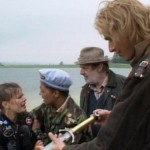 The father-daughter relationship between the Doctor and Ace has never been so evident as in the scene where she has to explain to him that she gave the sword up to Morgaine to save her own life, and he agrees that was the right thing to do: "Exotic alien swords are easy to come by… Aces are rare."
The father-daughter relationship between the Doctor and Ace has never been so evident as in the scene where she has to explain to him that she gave the sword up to Morgaine to save her own life, and he agrees that was the right thing to do: "Exotic alien swords are easy to come by… Aces are rare."
Later, she hurls herself into a vortex to get silver bullets to him, and he knows she has them even before she tells him – because of course she does! Their trust in each other and mutual respect is just lovely.
I really like the fact that this story, the first real UNIT story in more than a decade, explores violence and military solutions in a sophisticated way. We see that UNIT is now far better equipped to deal with the alien menace than ever before, thanks largely to Brig Classic's influence on them, but there's also a strong thread about the futility of war and violence. The Brigadier actually knocks out the Doctor, to take over the job of shooting the Destroyer – on the surface it's explained as him seeing himself as more expendable than the Doctor, but I like to think it's also about the Brig preventing the Doctor from bearing arms, because that's not his job. It makes for a marvellous coda to the UNIT years and to their long friendship.
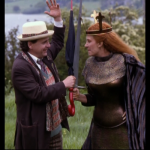 Something I found interesting in the extras is how Ben Aaronovitch, the writer of the show, actually feels his script was a failure. In particular (MAJOR SPOILERS IN CASE YOU HADN'T ALREADY NOTICED) he feels that he made a wrong narrative move in letting the Brig survive the story rather than being killed off as was originally planned. Personally I think that the Brigadier surviving is a far more interesting result, particularly because the narrative of the story was set so obviously on him dying heroically. Aaronovitch lamented that the baton was supposed to be passed to Bambera and now it wasn't – but um, actually, the baton WAS already passed. She is the Brigadier, she runs UNIT, she has the job. Brig Classic didn't come out of retirement because the job was too difficult for her to manage, he did it because the Doctor had turned up.
Something I found interesting in the extras is how Ben Aaronovitch, the writer of the show, actually feels his script was a failure. In particular (MAJOR SPOILERS IN CASE YOU HADN'T ALREADY NOTICED) he feels that he made a wrong narrative move in letting the Brig survive the story rather than being killed off as was originally planned. Personally I think that the Brigadier surviving is a far more interesting result, particularly because the narrative of the story was set so obviously on him dying heroically. Aaronovitch lamented that the baton was supposed to be passed to Bambera and now it wasn't – but um, actually, the baton WAS already passed. She is the Brigadier, she runs UNIT, she has the job. Brig Classic didn't come out of retirement because the job was too difficult for her to manage, he did it because the Doctor had turned up.
The Brigadier, crucially, does not take over from Bambera in the field. He operates instead, much like the Doctor, as a vigilante and independent troubleshooter.
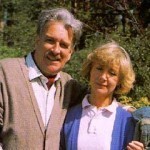 Also, and here we get back to the feminist issue, there's Doris. In the opening scenes of the story, the Brigadier's wife has a very traditional role. She represents happiness, domesticity and safety, and she questions his choice in returning to the field, even as she shows her resignation that she always knew their peaceful life together was temporary. Crucially, she has no idea who the Doctor is. Official secrets act or not, what does it say about their relationship that her husband never mentioned he was once good friends with a man from space?
Also, and here we get back to the feminist issue, there's Doris. In the opening scenes of the story, the Brigadier's wife has a very traditional role. She represents happiness, domesticity and safety, and she questions his choice in returning to the field, even as she shows her resignation that she always knew their peaceful life together was temporary. Crucially, she has no idea who the Doctor is. Official secrets act or not, what does it say about their relationship that her husband never mentioned he was once good friends with a man from space?
If the Brig had died, Doris would be a tragic and slightly pathetic footnote, one of those characters in Spooks or The Bill or other shows where people regularly get killed off for queen and country. It would have been BORING as hell. Instead we get a quirky but (I think) amusing epilogue in which the two halves of the Brigadier's world have been smushed together. Doris meets not only the Doctor and Ace, but also Shou Yiang, Bambera and Ancelyn, and the younger women sweep her off in Bessie for a day out. It's all a bit cheesy but after four episodes of watching so many women kick butt, I rather appreciated the laden-on-with-a-trowel feminist message at the end, with the ladies taking the Doctor's souped up roadster for a spin, and the gentlemen left behind to see to the house. Doris is most definitely giving her husband a gentle dig for abandoning her for his adventures, and making it clear that he gets to have a turn of doing the housework, and waiting for his honey to return.
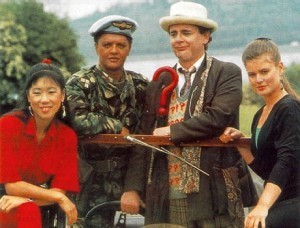 Sure, one of the most epic stories of the era ends with a wry chuckle and the Doctor volunteering to cook supper, rather than an almighty bang, but considering that the story was bangs galore, I'm okay with that.
Sure, one of the most epic stories of the era ends with a wry chuckle and the Doctor volunteering to cook supper, rather than an almighty bang, but considering that the story was bangs galore, I'm okay with that.
Also I choose to believe that Doris and the girls totally drove to Cambridge and picked up Dr Liz Shaw before they went on their adventure. She could do with a day out, I'm sure.
PS: Just discovered there's a second disc with an edited-together version of Battlefield and extra scenes. Wheeeee!

